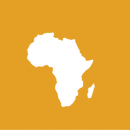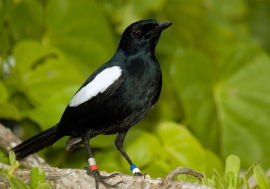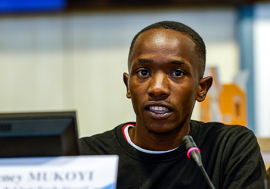‘Stability is based on democracy’
‘Stability is based on democracy’
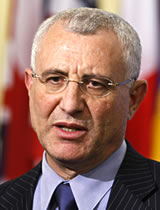 Photograph: UN / Paulo Filgueiras
Photograph: UN / Paulo FilgueirasSaid Djinnit has been the UN Secretary-General’s special representative and head of the UN Office for West Africa (UNOWA) since February 2008. He brings to his position a long record of promoting democracy and seeking to resolve armed conflicts in Africa. Mr. Djinnit, a seasoned Algerian diplomat, first joined the Organization of African Unity (OAU) in 1989, as director of the secretary-general’s cabinet. In that capacity he played a key role in shaping the body’s work on peace and security, democracy and human rights and in establishing the OAU Mechanism for Conflict Prevention, Management and Resolution. In 1999 he was elected the OAU’s assistant secretary-general for political affairs, participating in the elaboration of the organization’s declaration on “unconstitutional changes of government” and heading the task force that drafted the Constitutive Act of the new African Union (AU). With the transformation of the OAU into the AU in 2002, he became commissioner for peace, security and political affairs, a post he held until joining the UN. Now based at UNOWA’s offices in Dakar, Senegal, Mr. Djinnit visited UN headquarters in New York in January for the Secretary-General’s presentation of a report on the work of his office. During that visit, he shared with Africa Renewal his thoughts on Africa’s efforts to manage its political turbulence.
The Secretary-General’s January report on the work of your UN Office for West Africa refers to a worrying increase in unconstitutional changes in power in the region, including in Guinea and Niger. The African Union and the Economic Community of West African States (ECOWAS) have both condemned those moves, although not too long ago it was less common to hear such criticisms from African leaders. Do you see progress in the way African governments are coming to grips with these kinds of undemocratic changes in neighbouring countries?
What I consider huge progress in Africa is the fact that today the norm is that people should respect constitutions, and that whoever makes a move that is unconstitutional should be condemned. And not only condemned, but subject to sanctions. That’s big progress.
Africa made very speedy progress between 1999 and 2002. Every year, something happened. It involved a combination of forces, African people, civil society and leadership. It started at the Algiers summit [of the Organization of African Unity] in 1999, when for the first time the leaders formally said that we should not accept this phenomenon of the coup d’état anymore. One year later, at the summit in Togo, the OAU Secretariat proposed a draft document which was adopted as the Lomé Declaration. It set out how we should respond to unconstitutional changes in government. From there, we took it higher and higher. The peak was the launching of the African Union in Durban in 2002.
So from 1999 to 2002 there was very speedy progress in putting in place institutions, norms and values to bring together countries not just because they are united geographically, as one continent, but because they share common values.
What we are seeing now [with the recent unconstitutional changes] is a kind of setback, a sliding back. Why? Because institutions are not strong enough to sustain that progress. It’s like when you put up a new building. If you haven’t consolidated the first phase, it’s difficult to go forward with the second level of your building. The institutions are not strong enough to sustain that. Africa has engaged, genuinely, on the path of democracy, based on multi-party systems. That is now the norm in West Africa, basically. It’s just that the actors, the institutions involved are not strong.
The African Union has said that military coups cannot stand. But when Dadis Camara carried out his coup in Guinea in 2008, not all African governments condemned it. Some in the region suggested giving him time, to see how it goes. That didn’t turn out well, as we saw with the massacre of September 2009.
But formally, Africa’s institutions condemned the coup. ECOWAS condemned it, the African Union condemned it. And Guinea has been under sanctions until now. All countries have agreed on these norms and values. But their national institutions at home are not strong enough to prevent coups.
Take Niger. It has agreed to these norms and values. Because of the background of Niger — with very violent coups and counter-coups before 1999, but then stability after that — the government of Niger was one of those that pushed strongly for this new set of democratic values. But the institutions there were not able to prevent what happened subsequently in the country. Yet ECOWAS has still condemned that, and Niger is under ECOWAS sanctions.
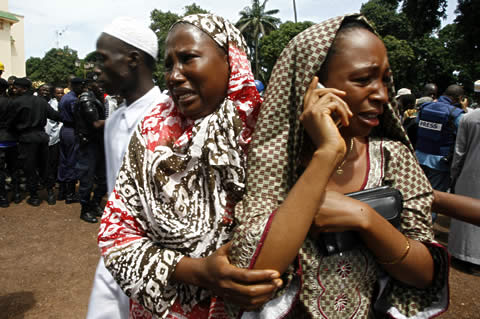 Women cry after identifying the body of a relative killed during an army massacre of protesters in Guinea: Reforming the Guinean military is a vital element in that country’s political transition.
Women cry after identifying the body of a relative killed during an army massacre of protesters in Guinea: Reforming the Guinean military is a vital element in that country’s political transition.In 2008 there was a military coup in Mauritania, and the AU and ECOWAS both condemned it. But a year later the same general who led the coup organized elections, in which he won the presidency. Since most African and other foreign observers judged that the elections were transparent, he gained international recognition. Doesn’t that send a signal that if a coup maker can just hold on and go through a process of elections, he’ll be OK?
You know, the mistake that can be done is to consider that since we have this rule, it will apply automatically, everywhere and every time. I remember when the African Union put forward the programme of NEPAD, with very far-reaching principles, and everybody in the West was very happy because this new thinking is close to European values, it’s very liberal. But then they said, hey, now we have to handle the case of Zimbabwe. It’s not because you said you’re willing to address the issues of governance, that you are ready to face the first challenge the next day. It’s like you want to go to the gym to be fit. And the next day they give you 30 kilos and say carry these 30 kilos. But I just started doing gym. Give me some time to build my capacity so I can carry 5 kilos, and then 6 and 7. Then hopefully I will come to your 30 kilos.
Secondly, we tried to put forward the principle that whoever has made a coup should not be able to stand for election. We tried. I know this question very well. When I was assistant secretary-general of political affairs of the OAU, we had a meeting of the Central Organ — it was like the Peace and Security Council established after 2003 in the African Union, but not as effective — and we adopted a resolution in which we stated that whoever is responsible for a coup d’état should not stand for election. But that was just a resolution, and it was never included in the [summit] document of 2000. So we have no legal basis to prevent anyone from standing in an election.
In Guinea, it’s only out of political considerations that we are saying that Dadis Camara cannot stand. We have no legal basis to stop anybody from standing. But we do have moral and political reasons, whenever we can. The political appreciation could differ from one situation to another. You could have a different appreciation of the situation in Mauritania and of the situation in Guinea. In Mauritania, if he takes it through clean elections that are open, transparent, under the supervision of international observers, who are we to stop him?
With a political transition now under way in Guinea, there have also been discussions about initiating reform of its army and other security institutions. But elsewhere in Africa it seems that the most serious security sector reform (SSR) programmes have been in countries emerging out of war, where peacekeeping missions can help push it along. In a country like Guinea, how do you build up the political momentum for security sector reform?
Actually, in the case of Guinea it will be easier. This is a country which has not gone through an open conflict and a peacekeeping process, but it has gone through serious tensions and incidents of violence. Everybody, including the junta leadership, fully recognizes that the key problem in Guinea is the army and that the defence institutions need to be reorganized and reformed. They are saying that if you do not reform the army, you will not be able to find a peaceful solution. Not the other way around, to have a peace agreement and then undertake an SSR exercise. So there is a consensus, internationally and nationally, of the need for SSR.
 Soldiers beating a civilian in Togo: Many African countries still do not have strong institutions for defending democracy and citizens’ participation.
Soldiers beating a civilian in Togo: Many African countries still do not have strong institutions for defending democracy and citizens’ participation.Guinea seems to be a very clear case, an outright military coup followed by serious repression. In Niger there was an open rift between the president on the one hand, and the Constitutional Court and the National Assembly on the other. But there are other cases that are grayer. In some countries there are dominant ruling parties that have amended the constitution to change or eliminate presidential term limits, to allow the incumbent to stay in power. Is that something that can be addressed?
It’s all unfinished business. In 2000 the OAU Secretariat proposed a declaration to be adopted by the summit on how to respond to unconstitutional changes of government. Our document had two pillars. The first pillar was the reaction to a coup by a soldier who comes from outside, removes whoever is there and says, “I’m in charge.” The other coup was the one done from within, by undermining the constitution, blocking institutions from allowing for democratic life. Unfortunately, that aspect of the document was not accepted in 2000 at the Lomé summit.
So at the Secretariat we said, OK, let’s build on our one pillar. With member states, you need to build confidence. You cannot ask them for everything. They will not accept it. They need to be reassured that they can cope. Unfortunately, that work was not pursued after 2003. For the AU, the legal ground is limited. But ECOWAS has some legal ground. The Protocol on Governance of ECOWAS condemns any review of a constitution which is not done consensually. That was the case in Niger. So this is work in progress. We are in a spirit of testing the new values to move further.
The AU, ECOWAS and other African institutions are all for democracy. But in some countries there remain serious threats to peace and stability. Some have argued that in such cases restoring or maintaining peace should take precedence, that if you have war, then little else is possible. Is there validity to that view?
Absolutely. Africa is struggling with a series of dilemmas. It wants peace. It wants development. It wants peace. It wants democracy. It wants peace. It wants justice. Sometimes, these principles could contradict each other. If at any time there is a choice to be made, Africa will always choose first and foremost peace. Peace and stability will always prevail over other things. Not because they don’t like the other things. But they have no option. Every African wants to have something to eat. But to have something to eat, you have to be assured that you can survive and live. If you give me development but you take my life, what is there?
But once peace has been restored, what are the next priorities: political stability, economic recovery, social reform? Are they distinct tasks, or do they go together?
It’s always related. It is difficult to say that you should do this before you do that. But doing that without doing this will not be easy either. It will be very difficult one day to conduct reforms, and then the next day you have a coup. Propitious political conditions will help address the real problems of economic development, and this is the biggest challenge after having restored peace. At the African Union, we invested much in preventing conflicts, which is very difficult, or in managing them. At least Africa, for a change, is being seen as addressing its own problems.
But be careful. The biggest problem is not only peace. It is governance — political and economic governance. For putting into place institutions for economic governance, you need stability, not necessarily democracy. Even in undemocratic countries, as long as stability is there, they can do business. But stability is also related to democracy. Stability, long-lasting stability, is based on democracy.
One of the key reforms that many people highlight is women’s empowerment. In some countries, like Liberia, we have seen enormous advances at the political level. But progress in social areas seems more difficult. What do you think of this issue?
There is a general problem of empowering the people of Africa, giving a chance to the people of Africa to make a difference, including women. Women have been purposely marginalized. Others have been marginalized, but women have been further marginalized. So it’s a general problem of empowering, of giving a chance to the people to improve their lives.
Initially, after independence, the thinking in Africa was that the state is there to do everything. But that is over. The people have understood that there is a limit to what the state can do, that real transformation can be made only by the people.
Women have been imprisoned in their countries. They are a huge reservoir of talent and imagination, and a force for peace. So releasing the energies of women in Africa will be a big part of the process of social enhancement and improvement.
The report on UNOWA’s work in West Africa highlights other emerging problems, such as drug trafficking, terrorism and so on. Doesn’t dealing with those issues in the long term come back to addressing the same “root causes” that have been identified as fueling conflict, such as youth unemployment and social injustice?
Absolutely. It goes inevitably to the root causes of the problem. You mentioned them: poverty, and then governance. The little resources we have are not properly managed and governed. The real challenge to peace and stability is governance, political and economic governance, so that the people feel that the power is fairly shared and that the resources are also fairly shared.

